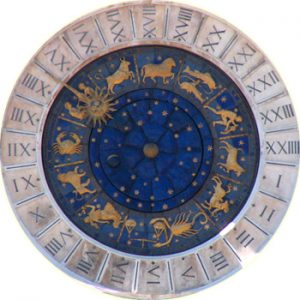This post is also available in Dutch.
Astrology, homeopathy or acupuncture are all examples of “pseudo-science”. How is pseudo-science different from science, and do you believe in it?

Zodiac clock at St. Mark’s Square in Venice (astrology). Image by Zachariel (CC0).
You’re reading your favorite magazine when you turn the page and there it is: the horoscopes section. Everybody has experienced this. Personally, I have always been intrigued by the predictions of my following week. As a researcher and therefore critical “disbeliever,” my sarcastic interest is fed by the range of forecasts on my personal life and health. Astrology is just one example of relatively harmless pseudo-science.
What is pseudo-science?
Pseudo-science is a belief, claim or practice that often describes something in “scientific” terms but lacks the validity and reliability of scientific measurements. Validity is an important asset in science which describes the extent to which a measurement or conclusion meets reality. In the case of measurement validity one tries to make sure that a device actually measures what it is supposed to measure, for instance, whether an electrocardiogram really measures the heart rate of an individual. Reliability instead focuses more on the quality of measurements and therefore evaluates the “repeatability” of a study’s finding. Imagine the study that indicated a relationship between vaccinations and autism. After some years of follow-up research, the results were interpreted as unreliable since other studies failed to find similar associations. (Interested in this topic? Read this.)
Scientific method
As a researcher, I can only say that the scientific process is a rather long, effortful but nevertheless necessary one. Scientific conclusions are a product of an iterative process that undergoes critical evaluations at every single step. Starting from observations of certain patterns in the real world (or simulations), a scientist formulates research questions and hypotheses, develops testable predictions (e.g., by designing an experiment that tries to manipulate the variable of interest while, at the same time, controlling for factors of non-interest), collects data, analyses the data and, based on the research findings, refines, alters, expands or rejects the hypotheses. After this process, the scientist writes a scientific report that is peer-reviewed by a selected number of experts in the field who will again decide whether the research is valid and reliable. This controlled fashion of knowledge dissemination tries to safeguard the credibility and reliability of knowledge. This responsibility is shared by all researchers that are highly trained in a certain matter. A treatment or product that results from this scientific process is therefore based on long-term, carefully weighted efforts by professionals.
Is pseudo-science harmless?
One can wonder about the risks of pseudo-science. In the case of astrology or horoscopes the risks seem relatively small at first sight. However, this heavily depends on the critical thinking of an individual. If someone starts to believe in pseudo-science and stops believing in real science, pseudo-science can be a real threat to the individual. Vulnerable persons like sick individuals who seek life-saving/life-changing remedies could be trapped by extraordinary claims that are often made by pseudo-scientific methods. So when I have to answer the question whether I believe in pseudoscience, my answer is that I try to be open-minded but always stay critical until scientific evidence shows its efficacy, that is, until it becomes science.
Written by Mahur.
Edited by Monica.
